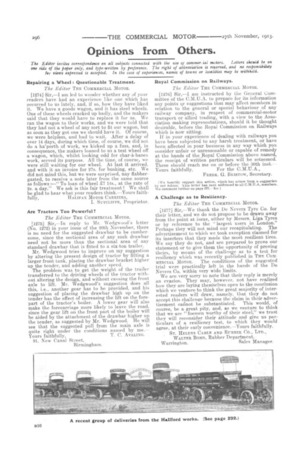Opinions from Others.
Page 20

If you've noticed an error in this article please click here to report it so we can fix it.
The Editor invites correspondence on all subjects connected with the use of commer,ial motors. Leiters should be on one side of the paper only, and type-written by preference. The right of abbreviation is reserved, and no responsibility for views sapressed is accepted. In the case of experiences, names of towns or localities may be withheld.
Repairing a Wheel: Questionable Treatment.
The Editor TTIE COMMERCIAL MOTOR.
[1274] am led to wonder whether any of your readers have had an experience like one which has occurred to us lately, and, if so, how they have liked it. We have a goods wagon, and it has steel wheels. One of these wheels cracked up badly, and the makers said that they would have to replace it for us. We ran the wagon to their works, and we were told that they had riot a wheel of any sort to fit our wagon, but as soon as they got one we should have it. Of course, we were helpless, and had to wait. After a delay of over 14 days, during which time, of course, we did not do a ha'porth of work, we kicked up a fuss, and, in consequence, the makers loaned to us a test wheel off a wagon, which, whilst looking odd for char-a-banes work, served its purpose. All the time, of course, we were still waiting for our wheel. At last it arrived, and with it an invoice for 27s. for bushing, etc. We did not mind this, but we were surprised, nay flabbergasted, to receive a note later from the same source as follows :—" To loan of wheel £7 14s., at the rate of 2s. a day." We ask is this fair treatment? We shall be glad to hear what your readers think.—Yours
HALIFAX MOTOR CARRIERS,
I. SUTCLIFFE, Proprietor.
Are Tractors Too Powerful?
The Editor TEE COMMERCIAL MOTOR.
[1275] Sir,—In reply to Mr. Weclgw.00d's letter (No. 1272) in your issue of the 20th November, there is no need for the suggested drawbar to be cumbersome, since the sectional area of any such drawbar need not be more than the sectional area of any standard drawbar that is fitted to a six-ton trailer.
Mr. Wedgwood tries to improve on my suggestion by altering the present design of tractor by fitting a larger front tank, placing the drawbar bracket higher up the tender, and adding another speed.
The problem was to get the weight of the trailer transferred to the driving wheels of the tractor without altering the design, and without causing the front axle to lift. Mr. Wedgwood's suggestion does ail this, i.e., another gear has to be provided, and his suggestion of placing the drawbar high up on the tender has the effect of increasing the lift. on the forepart of the tractor's boiler. A lower gear will also make the forecarriage more likely to leave the road. since the gear lift on the front part of the boiler will be aided by the attachment of the drawbar higher up the tender, as suggested by Mr. Wedgwood. He will see that the suggested pull from the main axle is quite right under the conditions named by me.— Yours faithfully, T. C. AVELING. 91, New Canal Street,
Royal Commission on Railways.
The Editor THE COMMERCIAL MOTOR.
[1270] Sir,-1 am instructed by the General Committee of the C.M.U.A. to prepare for its information any points qr suggestions that may affect members in relation to the general or special behaviour of any railway company, in respect of commercial-motor transport or allied trading, with a view to the Association making representations, should it be thought desirable, before the Royal Commission on Railways which is now sitting. If in your experience of dealing with railways you have been subjected to any harsh treatment, or have been affected in your business in any way which you consider unfair or unreasonable or capable of remedy at the hands of the Royal Commission above named, the receipt of written particulars will be esteemed. These should reach me on or before the 30th inst.- Yours faithfully, For the C.M.U.A., FREDK. G. BRISTOW, Secretary.
[We heartily support this action, which has arisen from a suggestion by our Editor. This leiter has been addressed to all C.M.U.A. members. We comment further on page 2T7.--End A Challenge as to Resiliency.
The Editor TILE COMMERCIAL MOTOR.
[1277] Sir,—We thank the De Nevers Tyre Co. for their letter, and we do not propose to be drawn away from the point at issue, either by Messrs. Liga Tyres or by reference to the "largest users in London." Perhaps they will not mind our recapitulating. The advertisement to which we took exception claimed for its inserters that they made the most resilient tires. We say they do not, and are prepared to prove our statement or to give them the opportunity of proving theirs, by means of the challenge as to a test for resiliency which was recently published in THE COMMERCIAL MOTOR. The conditions of the suggested trial were practically left in the hands of the De Nevers Co. within very wide limits. We are very sorry to note that their reply is merely an evasion. They may, however, not have realized how they are laying them-selves open to the conclusion which we venture to think the great majority of interested readers will draw, namely, that they do not accept this challenge because the claim in their advertisement cannot be substantiated. This would, of course, be a great pity, and, as we venture to think that we are " foemen worthy of their steel," we trust they will reconsider their attitude and give us particulars of a resiliency test, to which they would agree, at their early convenience.—Yours faithfully, ST. HELENS CABLE AND RUBBER CO., LTD., WALTER BOND, Rubber Department,
Warrington. Sales Manager.
























